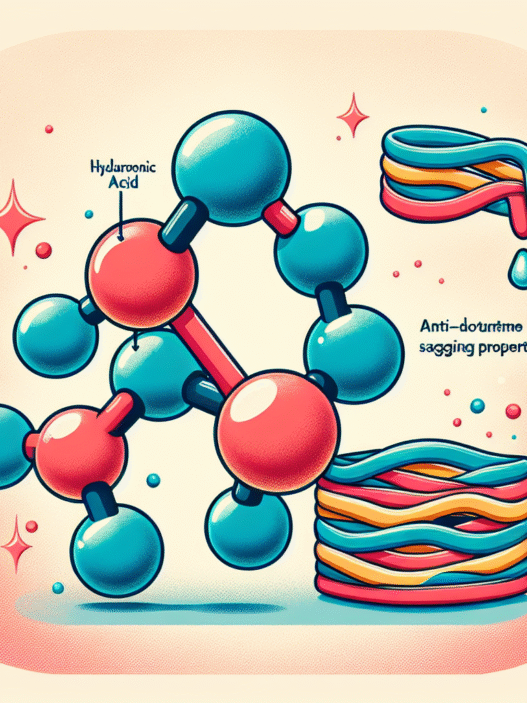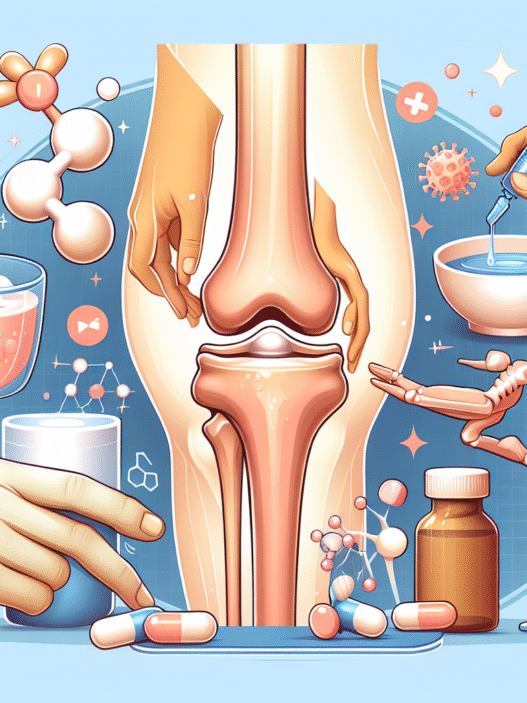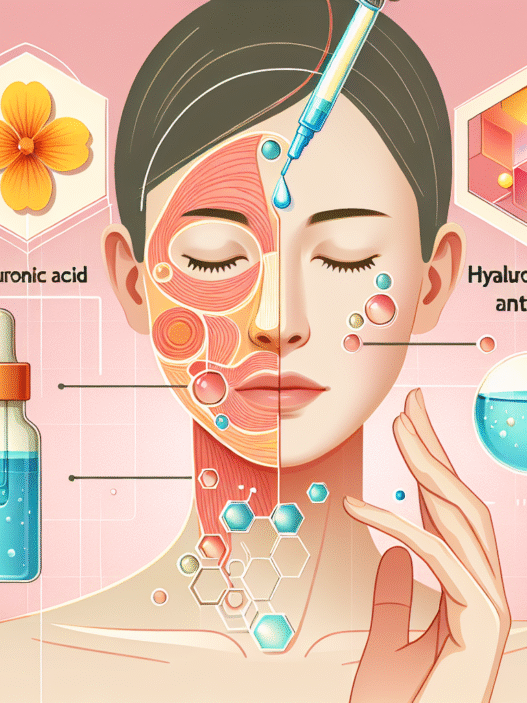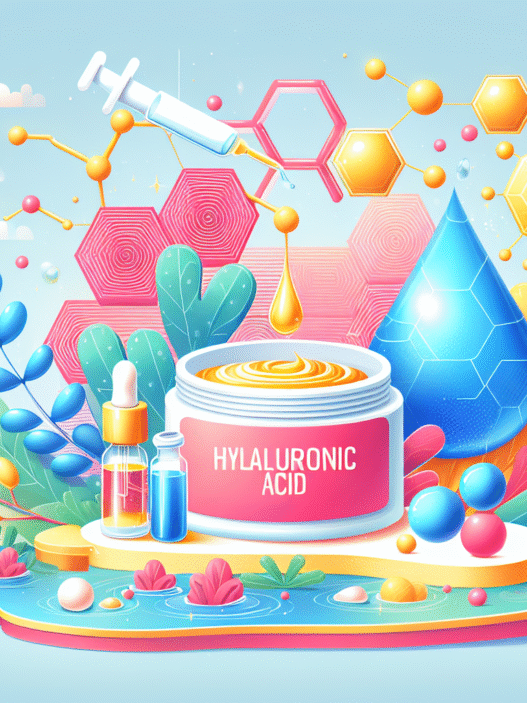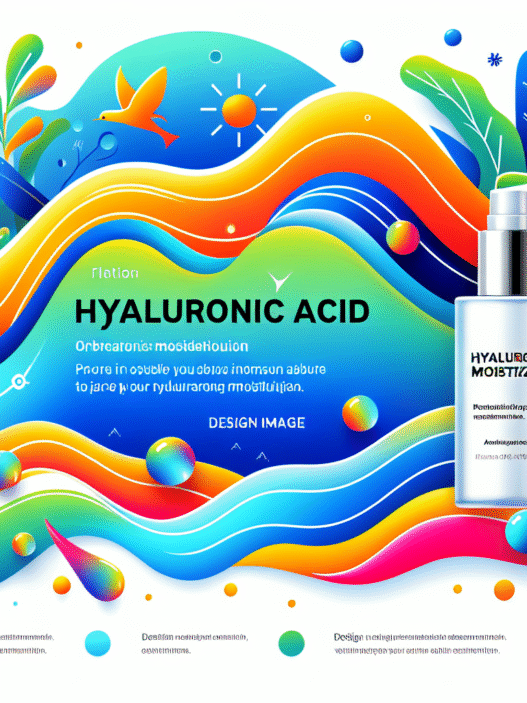Understanding Hyaluronic Acid
Role in Skin Health
Hyaluronic acid (HA) is a natural polymer that plays a vital role in maintaining skin health. Known for its remarkable ability to hold significant amounts of water, HA is a crucial component in moisturizing products. It can retain about one and a half gallons of water per quarter-teaspoon, making it essential for skin moisture retention (Cleveland Clinic).
Research indicates that hyaluronic acid is effective in enhancing skin hydration and rejuvenation, thereby serving as an important element in the extracellular matrix. Dermal products infused with HA are well tolerated and contribute to both hydration and anti-aging effects, providing a noninvasive solution to improve skin quality (PubMed). Additionally, HA-containing products can mitigate the adverse impacts of environmental factors such as UV light and air pollution, which accelerate skin aging by damaging the skin’s moisture supply.
| Property | Description |
|---|---|
| Water Retention | Holds substantial amounts of water for skin hydration |
| Skin Rejuvenation | Enhances skin elasticity and reduces signs of aging |
| Environmental Protection | Restores lost HA to counteract pollution and UV damage |
Learn more about how hyaluronic acid benefits your skin.
Importance for Joint Function
Beyond skin care, hyaluronic acid also plays a significant role in joint health. Intraarticular hyaluronic acid injections are utilized for pain relief in osteoarthritis. These injections stimulate native synovial sites to produce HA, exhibiting anti-inflammatory effects and demonstrating long-lasting efficacy for alleviating joint pain (NCBI Bookshelf).
Furthermore, HA fillers can help counteract the effects of aging in joints by replacing lost volume, boosting collagen production, and enhancing fibroblast morphology, which results in improved joint function and comfort. This dual function of hyaluronic acid makes it a valuable contributor to both beauty and health.
| Joint Health Benefit | Description |
|---|---|
| Pain Relief | Provides long-lasting relief in osteoarthritis |
| Volume Replacement | Replaces lost volume to enhance joint function |
| Anti-inflammatory | Eases inflammation for better mobility |
For an in-depth look at how hyaluronic acid for joints can contribute to overall well-being, explore further resources.
Hyaluronic Acid in Skincare
Hyaluronic acid is gaining recognition in the beauty and skincare community due to its remarkable ability to hydrate and rejuvenate the skin. This section outlines its benefits in skin moisturization, wrinkle reduction, and its positive effects on the scalp and hair.
Skin Moisturization Benefits
One of the primary benefits of hyaluronic acid is its exceptional ability to retain moisture. This naturally occurring substance can hold up to 1,000 times its weight in water, making it a highly effective moisturizer. Regular use can lead to increased skin hydration levels, resulting in a plump and youthful appearance WebMD.
A study revealed that participants taking a daily hyaluronic acid supplement of 120 milligrams for 12 weeks saw substantial improvements in skin moisturization and a reduction in the appearance of wrinkles WebMD.
| Study Duration | Supplement Dosage | Results |
|---|---|---|
| 12 weeks | 120 mg | Improved skin moisturization and reduced wrinkles |
For more on topical applications, refer to our article on hyaluronic acid for skin.
Reduction of Wrinkles and Fine Lines
Hyaluronic acid not only maintains skin hydration but also plays a vital role in reducing the appearance of wrinkles and fine lines. By promoting moisture retention and improving skin elasticity, it contributes to a smoother and more youthful look.
The anti-aging properties of hyaluronic acid make it a popular ingredient in serums hyaluronic acid serum and moisturizers hyaluronic acid moisturizer. It aids in skin renewal by enhancing skin regeneration and repair processes, leading to a more youthful complexion over time.
| Benefit | Description |
|---|---|
| Wrinkle Reduction | Helps diminish the appearance of fine lines |
| Skin Elasticity | Enhances skin firmness and suppleness |
For further insights, consider our analysis of hyaluronic acid and anti-aging properties.
Scalp and Hair Benefits
Hyaluronic acid also offers notable advantages for scalp and hair health. Its moisturizing properties help enhance hair texture, reduce frizz, and promote overall scalp well-being. When incorporated into hair products like shampoos or conditioners, it can provide significant hydration, contributing to healthier, shinier hair WebMD.
While further studies are needed to fully understand its efficacy on hair, current evidence suggests positive outcomes for individuals looking to improve hair manageability and moisture levels. For specific methods on use, please refer to our discussion on hyaluronic acid for hair.
| Benefit | Description |
|---|---|
| Scalp Health | Hydrates and soothes dry scalps |
| Hair Texture | Improves manageability and reduces frizz |
Understanding these benefits assists beauty and skincare enthusiasts in making informed choices regarding hyaluronic acid as part of their skincare regimen.
Health Benefits of Hyaluronic Acid
Hyaluronic acid is not just a skincare darling; it also offers several health benefits that extend beyond beauty. Its unique properties make it valuable for joint health, urinary function, and wound healing.
Pain Relief in Osteoarthritis
Hyaluronic acid injections, often referred to as viscosupplementation, are FDA-approved for easing knee pain in individuals diagnosed with mild to moderate osteoarthritis. These injections may provide relief for up to a year, making them an appealing option for those struggling with joint discomfort.
| Treatment | Duration of Relief | Condition |
|---|---|---|
| Hyaluronic Acid Injections | 6 months to 1 year | Knee Osteoarthritis |
Studies indicate that these injections are generally safe and effective, although some patients may experience minor side effects such as local swelling and pain after treatment.
Urinary Health Support
Hyaluronic acid also plays a significant role in urinary health. A study showed that individuals suffering from interstitial cystitis, a painful bladder condition, experienced a notable reduction in urinary urgency and overall pain after receiving treatment with hyaluronic acid. Specifically, there was a 40% reduction in nighttime urinary urges and a 30% decrease in overall pain, with a concurrent reduction in the need for painkillers during the treatment period.
| Condition | Urgency Reduction | Pain Reduction | Need for Painkillers |
|---|---|---|---|
| Interstitial Cystitis | 40% | 30% | Decreased |
Wound Healing Properties
The ability of hyaluronic acid to aid in wound healing is well-documented. Topical applications have been found to assist in regulating inflammation and facilitating tissue growth. This makes hyaluronic acid beneficial not only for minor wounds such as burns but also for more severe injuries like postsurgical scars. Research highlights the importance of hyaluronic acid as a scaffold for new tissue growth, helping to enhance the healing process.
Hyaluronic acid’s multifaceted benefits in pain relief, urinary health, and wound healing position it as a vital component in both health and beauty. For more information about the various applications and advantages of hyaluronic acid, explore our articles on hyaluronic acid benefits and hyaluronic acid supplements.
Hyaluronic Acid Supplements
Hyaluronic acid (HA) is not only beneficial when applied topically but is also available in supplement form. These supplements offer various advantages for skin health and overall wellness, making them popular among beauty and skincare enthusiasts.
Oral Consumption Benefits
Taking hyaluronic acid supplements can significantly improve skin health. Research has indicated that oral hyaluronic acid may help enhance skin hydration, skin tone, and epidermal thickness. A study involving 123 females of various ages and skin types found improvements in these areas when they consumed oral hyaluronic acid supplements. This aspect of HA reflects its power as a key player in combating skin aging.
Moreover, hyaluronic acid’s ability to bind up to 1000 times its volume in water makes it an exceptional moisturizer, which can help improve skin texture and reduce dryness that often accompanies aging. Long-term use of HA supplements has also been associated with overall skin health improvement, making them an appealing option for those seeking anti-aging solutions.
Oral Supplement Efficacy
The efficacy of hyaluronic acid supplements has been supported by various studies and reports. For instance, research indicates that hyaluronic acid taken orally can effectively improve and maintain skin health. The results suggest that the benefits of HA can be realized not only through topical application but also through consumption.
| Study Findings | Effects of Oral Hyaluronic Acid |
|---|---|
| Skin Hydration | Enhanced skin hydration and moisture retention |
| Skin Tone | Improved skin tone and texture |
| Epidermal Thickness | Increased overall epidermal thickness |
Hyaluronic acid supplements provide a convenient way to support skin health and combat the visible signs of aging. Incorporating these supplements into a daily routine may help individuals achieve more youthful, hydrated, and resilient skin, further enhancing their beauty and skincare regimen. For more insights on how HA benefits the skin, check out our articles on hyaluronic acid benefits and hyaluronic acid for skin.
Topical Application of Hyaluronic Acid
Hyaluronic acid has garnered attention for its effective and versatile application in skincare. Its benefits are particularly notable when used topically, contributing to skin hydration, wound healing, and post-surgical rejuvenation.
Skin Hydration Improvement
Topical hyaluronic acid is well-documented for its ability to improve skin hydration. A 2021 study involving 40 women aged 30 to 65 showed that applying hyaluronic acid twice daily led to significant improvements in skin hydration and quality after six weeks (Medical News Today). By attracting and retaining moisture, hyaluronic acid helps maintain the skin’s elasticity and plumpness, which are critical factors in anti-aging.
| Study | Participants | Duration | Results |
|---|---|---|---|
| 2021 Study on hyaluronic acid | 40 women aged 30-65 | 6 weeks | Improved skin hydration and quality |
For those seeking to enhance their routines, incorporating a hyaluronic acid serum or hyaluronic acid moisturizer can yield positive results.
Wound Healing Properties
Hyaluronic acid has been shown to assist in wound healing as well. It regulates inflammation and promotes tissue regeneration, making it beneficial for both minor wounds, such as burns, and more severe injuries, including postsurgical scars. Research indicated in a 2022 review confirms the efficacy of topical hyaluronic acid for aiding in the healing process and improving scar appearance (Medical News Today).
| Wound Type | Effect of Hyaluronic Acid |
|---|---|
| Minor Wounds (e.g., burns) | Regulates inflammation, promotes healing |
| Surgical Scars | Enhances tissue repair, improves appearance |
Post-Surgical Rejuvenation Effects
Topical applications of hyaluronic acid are increasingly utilized in post-surgical settings. A 2022 review highlights its effectiveness in treating skin aging following facial or postsurgical rejuvenation procedures. It enhances hydration and overall skin quality, leading to improved patient outcomes. Additionally, hyaluronic acid fillers can complement the effects of Botox injections, making them a popular choice for those seeking more significant anti-aging benefits.
For beauty enthusiasts interested in obtaining youthful skin, exploring hyaluronic acid and anti-aging benefits can be an informative starting point. With its multiple applications, hyaluronic acid remains a cornerstone in the pursuit of radiant and resilient skin.
Safety and Considerations
Safety of Over-the-counter Products
Over-the-counter hyaluronic acid products applied to the skin or used in eye care formulations are generally recognized as safe. This includes various forms of hyaluronic acid, such as hyaluronic acid serum and hyaluronic acid moisturizer. Oral hyaluronic acid supplements are also deemed safe; however, it is advisable to inform a healthcare provider about their use. Individuals should ensure that they are using products appropriately to avoid any potential complications.
Administration by Healthcare Professionals
Prescription hyaluronic acid products, which can include injections for conditions like osteoarthritis, must be administered by qualified healthcare providers precisely as directed. Incorrect administration may lead to severe complications or adverse effects. Hyaluronic acid injections have received FDA approval specifically to alleviate knee pain in individuals with mild to moderate osteoarthritis when other treatments have failed. Studies indicate that these injections are generally safe, but minor side effects such as local swelling and pain at the injection site can occur.
Potential Side Effects
While hyaluronic acid is widely considered safe, there can be potential side effects associated with its use. For topical applications, research has shown that hyaluronic acid can assist in wound healing by regulating inflammation, which may help with both minor and major wounds. However, some individuals may experience irritation or allergic reactions to topical products containing hyaluronic acid.
For injectable forms, patients may experience localized swelling or pain after treatment. It is essential to monitor for any unusual reactions and consult a healthcare provider if severe or persistent side effects develop. For further insights about the use of hyaluronic acid in various forms, individuals can explore our articles on hyaluronic acid benefits and hyaluronic acid injections.















